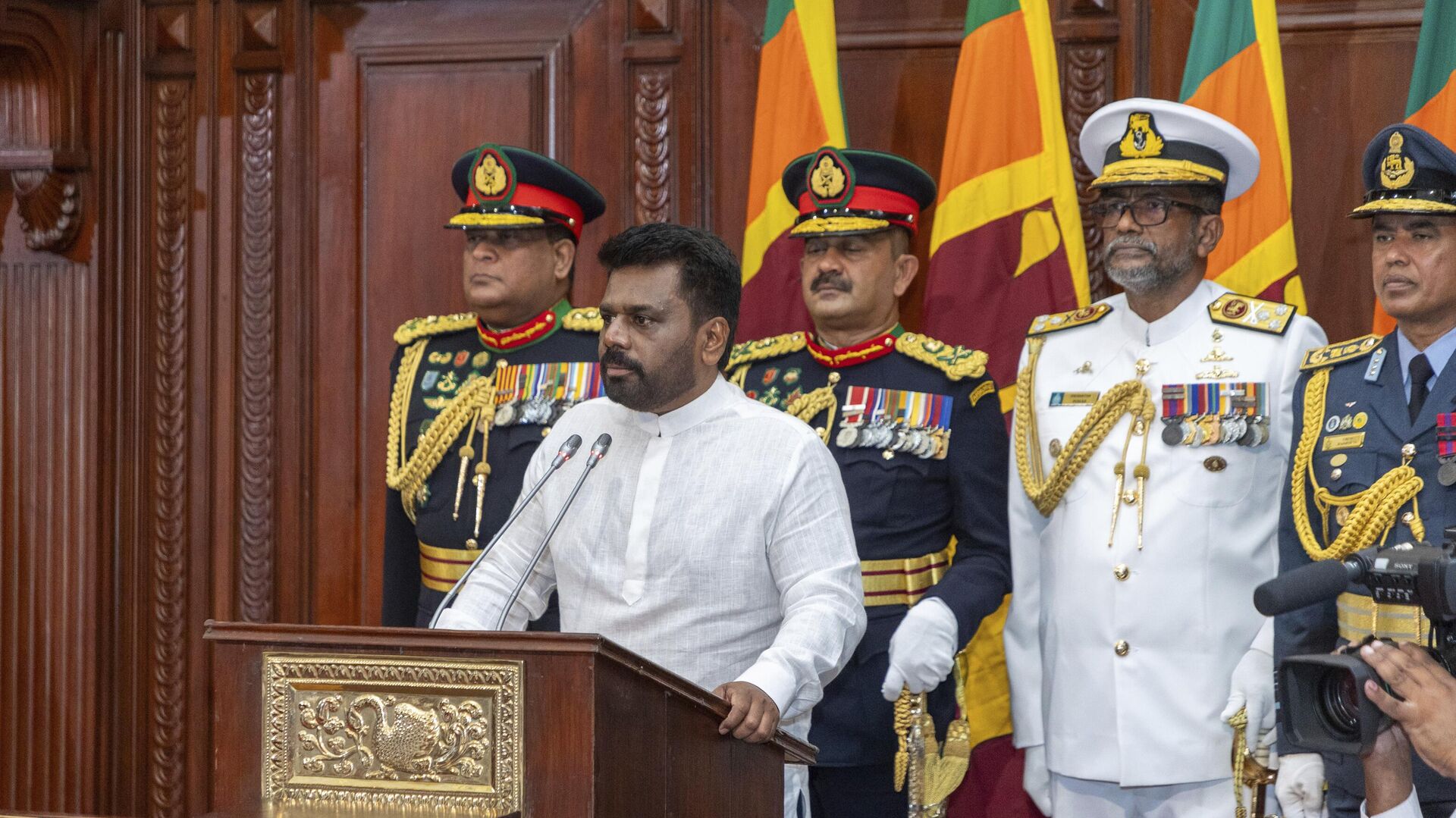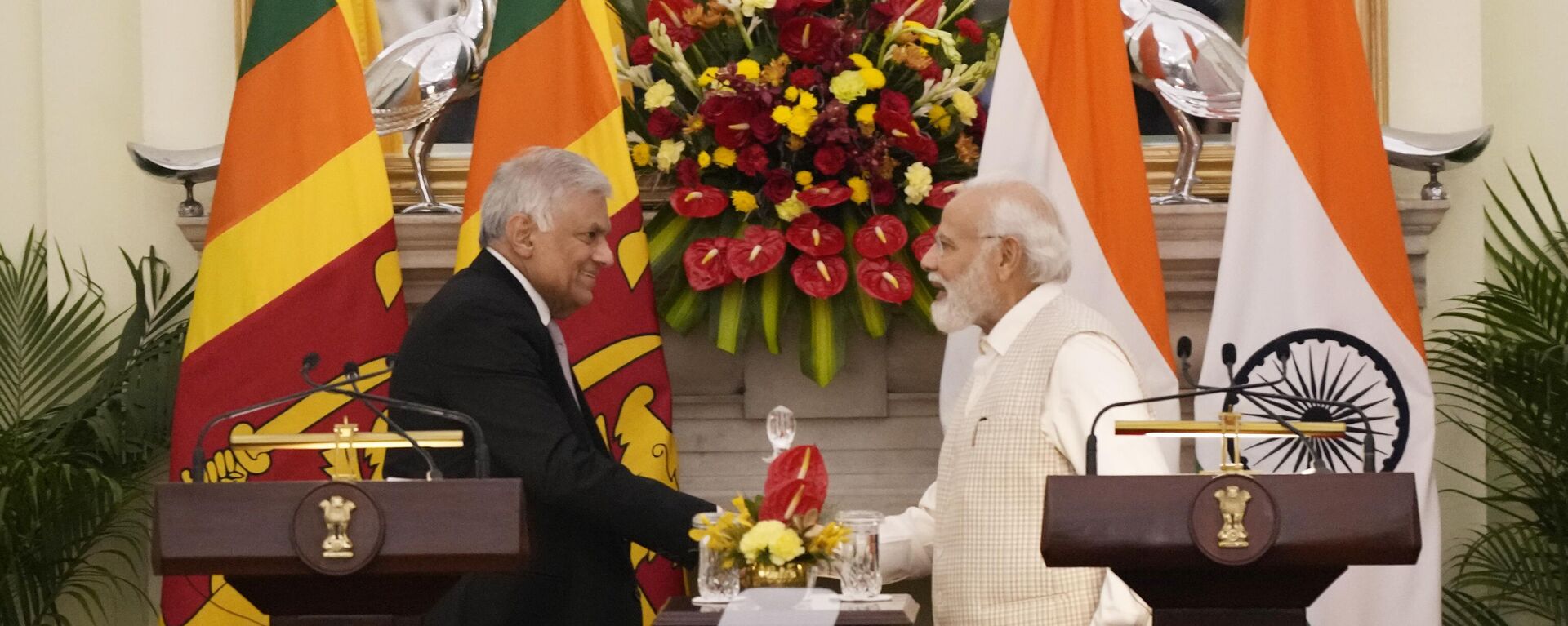https://sputniknews.in/20240923/brics-bank-doesnt-force-conditionalities-unlike-imf-8190830.html
New Sri Lankan Government to Face IMF Pressure on 'Fragile' Economy
New Sri Lankan Government to Face IMF Pressure on 'Fragile' Economy
Sputnik India
The International Monetary Fund (IMF) recently compelled Sri Lanka to implement harsh austerity measures, increase income taxes, and cut public spending ... 23.09.2024, Sputnik India
2024-09-23T21:46+0530
2024-09-23T21:46+0530
2024-09-24T12:21+0530
sputnik opinion
sri lanka
india
south asia
world bank
imf loan
economics
economic crisis
economic challenges
brics
https://cdn1.img.sputniknews.in/img/07e8/09/17/8192397_0:68:3115:1820_1920x0_80_0_0_25935c05a7158a7eff311aefe518c468.jpg
Sri Lanka's newly-appointed leader Anura Dissanayake was sworn in as president on Monday after comfortably winning the country's elections.The 55-year-old had previously promised the Sri Lankan people that he would renegotiate the terms of the IMF bailout package that has significantly increased hardships for the nation of 22 million.Last year, the IMF approved a $3 billion financial assistance programme following Sri Lanka's sovereign default in 2022. So far, it has disbursed over $1 billion, including $336 million earlier this year.However, the assistance has come with strict conditions, leading to further suffering for the population, who have already endured a prolonged period of economic hardship.Sri Lanka's demographics include Sinhalese (Buddhist), Tamil (predominantly Hindu), and Muslims, and when such nations start having economic difficulties, the populist governments that are in power start blaming one of these ethnicities for the hardships, making it a political and economic issue, she opined.She stated that the IMF's tightening grip on the economy has made it easier for Western powers to intervene. The previous government under Gotabaya Rajapaksa pursued disastrous economic policy. Gotabaya attempted to shift the agricultural sector towards organic farming while lowering taxes for the wealthy, which sparked widespread protests. These demonstrations were directed not only at Rajapaksa’s regime but also at the IMF, Chenoy suggested.The biggest challenge for Dissanayake will be resisting the conditions imposed by the IMF and other Western lenders. Chenoy noted that these institutions often entrap small nations in a cycle of debt and growing inequality, where a small elite holds most wealth while the majority remain impoverished.Chenoy also highlighted Sri Lanka's energy crisis, when the country had to pay for crude imports in dollars to align with IMF and World Bank policies."Sri Lanka is in a bind," the expert emphasised. "If there's another mass uprising due to the IMF's harsh conditions, foreign investors would stop investing in the country, tourists would not want to visit it, and to top it all, there would be civil unrest," Chenoy underlined.Sri Lanka's new government needs to look at the sustainable development goals (SDGs) and make a big issue of the pressure exerted by the IMF, seeking ways to counteract it, she concluded.
https://sputniknews.in/20240623/sri-lanka-rides-out-economic-turmoil-with-major-boost-from-india-7686413.html
sri lanka
india
south asia
Sputnik India
feedback.hindi@sputniknews.com
+74956456601
MIA „Rossiya Segodnya“
2024
Pawan Atri
https://cdn1.img.sputniknews.in/img/07e6/0c/13/139630_147:0:831:684_100x100_80_0_0_8fa2b25903e7787fe6a2698552c167df.png
Pawan Atri
https://cdn1.img.sputniknews.in/img/07e6/0c/13/139630_147:0:831:684_100x100_80_0_0_8fa2b25903e7787fe6a2698552c167df.png
News
en_IN
Sputnik India
feedback.hindi@sputniknews.com
+74956456601
MIA „Rossiya Segodnya“
Sputnik India
feedback.hindi@sputniknews.com
+74956456601
MIA „Rossiya Segodnya“
Pawan Atri
https://cdn1.img.sputniknews.in/img/07e6/0c/13/139630_147:0:831:684_100x100_80_0_0_8fa2b25903e7787fe6a2698552c167df.png
sri lanka, india, south asia, world bank, imf loan, economics, economic crisis, economic challenges, brics, brics currency, trade in national currencies, jawaharlal nehru university (jnu), sustainable developments goals (sdg)
sri lanka, india, south asia, world bank, imf loan, economics, economic crisis, economic challenges, brics, brics currency, trade in national currencies, jawaharlal nehru university (jnu), sustainable developments goals (sdg)
New Sri Lankan Government to Face IMF Pressure on 'Fragile' Economy
21:46 23.09.2024 (Updated: 12:21 24.09.2024) The International Monetary Fund (IMF) recently compelled Sri Lanka to implement harsh austerity measures, increase income taxes, and cut public spending — actions that have become highly unpopular in the country.
Sri Lanka's newly-appointed leader Anura Dissanayake was sworn in as president on Monday after comfortably winning the country's elections.
The 55-year-old had previously promised the Sri Lankan people that he would renegotiate the terms of the IMF bailout package
that has significantly increased hardships for the nation of 22 million.
Last year, the IMF approved a $3 billion financial assistance programme following Sri Lanka's sovereign default in 2022. So far, it has disbursed over $1 billion, including $336 million earlier this year.
However, the assistance has come with strict conditions, leading to further suffering for the population, who have already endured a prolonged period of economic hardship.
"Privatise the public sector, cut social expenditures, introduce austerity measures, and reduce welfare programs. Bring financialization so that foreign direct investment comes which is as easy to come as it is to go. The IMF has this mantra for all these small states which are fragile economies, even more fragile populations, and more often a difficult ethnic mix like Sri Lanka," Dr. Anuradha Chenoy, a former dean at the School of International Studies at the Jawaharlal Nehru University, told Sputnik India.
Sri Lanka's demographics include Sinhalese (Buddhist), Tamil (predominantly Hindu), and Muslims, and when such nations start having economic difficulties, the populist governments that are in power start blaming one of these ethnicities for the hardships, making it a political and economic issue, she opined.
She stated that the IMF's tightening grip on the economy has made it easier for Western powers to intervene.
The previous government under Gotabaya Rajapaksa pursued disastrous economic policy. Gotabaya attempted to shift the agricultural sector towards organic farming while lowering taxes for the wealthy, which sparked widespread protests. These demonstrations were directed not only at Rajapaksa’s regime but also at the IMF, Chenoy suggested.
The biggest challenge for Dissanayake will be resisting the conditions imposed by the IMF and other Western lenders. Chenoy noted that these institutions often entrap small nations in a cycle of debt and growing inequality, where a small elite holds most wealth while the majority remain impoverished.
This is why she considers the BRICS Bank to be essential. Although it cannot yet provide loans comparable to the IMF or World Bank, it does not impose conditions on developing nations and offers loans in local currencies, Chenoy pointed out.
Chenoy also highlighted Sri Lanka's energy crisis, when the country had to pay for crude imports in dollars to align with IMF and World Bank policies.
"Sri Lanka is in a bind," the expert emphasised. "If there's another mass uprising due to the IMF's harsh conditions, foreign investors would stop investing in the country, tourists would not want to visit it, and to top it all, there would be civil unrest," Chenoy underlined.
Sri Lanka's new government needs to look at the
sustainable development goals (SDGs) and
make a big issue of the pressure exerted by the IMF, seeking ways to counteract it, she concluded.



